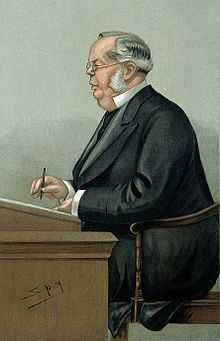William Broadbent


Sir William Henry Broadbent, 1st Baronet, KCVO, (23 January 1835 – 10 July 1907) was an English neurologist who was born in Lindley, now part of Huddersfield, West Yorkshire. [1] He studied medicine at Owens College and the Royal School of Medicine in Manchester. For most of his career he was associated with St Mary's Hospital, London (1859–1896), and also the London Fever Hospital (1860–1879).
Broadbent was a leading British authority in the field of cardiology as well as neurology. He also performed research involving diseases such as tuberculosis and cancer. In 1881 he was elected President of the London Medical Society [2] and in 1887 President of the Clinical Society of London.[3]
The months of November 1891 to October 1892 were critically important to Broadbent and his career, and gave him a narrow involvement in a notorious series of crimes. In November to December 1891 Broadbent was involved in saving the life of Prince George (the future King George V) from typhoid fever. At about the same time that he was involved in this he was sent a mysterious letter accusing him of murdering a prostitute named Matilda Clover the previous October with poison. This letter demanded a huge blackmail amount or face ruin. The Doctor wisely sent the letter to Scotland Yard. In January 1892 Broadbent was sent for by the Royal Family in an attempt to save Albert Victor, Duke of Clarence and Avondale the older son of the Prince and Princess of Wales and "heir presumptive" to the throne of England. The Prince, known as "Prince Eddy" to the public (and nicknamed "Collars and Cuffs" due to some wardrobe choices he made) had caught a virulent strain of influenza. Broadbent tried everything he could to save the Duke, but on 14 January 1892 the Duke died. However, the Prince of Wales sent Broadbent a letter thanking him for his endeavors, that preserved for him and his wife one of their sons.
Then, in the late spring, Broadbent was informed of a police investigation into the deaths of a series of prostitutes in the Stepney and Lambeth areas of London that began in October 1891 and continued until April 1892. One of the victims was Matilda Clover, who had been classified as having died of natural causes...but the letter from the blackmailer to Broadbent gave details showing the woman had been poisoned. An arrest was made in June 1892 of one Dr. Thomas Neill for blackmailing another Doctor named Harper. Subsequently this was changed to a charge of murder for the poisoning of Matilda Clover. The trial of the defendant (who is better recalled as Dr. Thomas Neill Cream occurred in October 1892, with the charges including the attempted blackmail of Dr. Broadbent, and Broadbent's appearance as a witness. Cream was found guilty and sentenced to death, being hanged in November 1892.
Broadbent was a Physician in Ordinary to Queen Victoria and King Edward VII, and was created a baronet in 1893. He was appointed a Knight Commander of the Royal Victorian Order, KCVO, in March 1901.[4]
Associated eponyms:
- Broadbent apoplexy: A type of stroke caused by a cerebral hemorrhage into the ventricular system.
- Broadbent sign: Recession of the intercostal spaces (near the eleventh and twelfth ribs on the left side of the back) as a sign of adherent pericardium (this sign was first described by his son, Walter Broadbent, in 1895).[5]
- Broadbent inverted sign: Pulsations synchronizing with ventricular systole on the posterior lateral wall of the chest in gross dilatation of the left atrium.
- Broadbent law: Medical law that states "lesions of the upper segment of the motor tract cause less marked paralysis of muscles that habitually produce bilateral movements than of those that commonly act independently of the opposite side".
Selected writings
- Cancer: A New Method of Treatment (London, 1866)
- The Practice of Medicine, (revised by Sir William Broadbent; 7th ed., London 1875)
- The Pulse (largely a reproduction of the Croonian Lectures, 1887), (London, 1890)
- Heart Disease, With Special Reference to Prognosis and Treatment, (with John Francis Harpin Broadbent), (London, 1897)
Notes
- ↑ Law, Edward. "HUDDERSFIELD & DISTRICT HISTORY CONNECTIONS WITH TITLED CLASSES IN MODERN TIMES:".
- ↑ "Transactions of the Medical Society of London". Retrieved 22 November 2014.
- ↑ "Transactions of the Clinical Society of London" 38. 1905.
- ↑ The London Gazette: no. 27296. p. 2019. 19 March 1901.
- ↑ Firkin, Barry G. and Whitworth, Judith A. (2001). Dictionary of Medical Eponyms. Informa Health Care. p. 47. ISBN 978-1-85070-333-4.
References
| Wikimedia Commons has media related to William Broadbent. |
- Biography of Willam Henry Broadbent
- Bloomfield, Jeffrey The Doctor Wrote Some Letters, R. W. Stone, Q.P.M. (ed.) THE CRIMINOLOGIST (Winter 1991: Volume 15, Number 4) (p. 224 – 244).
| Baronetage of the United Kingdom | ||
|---|---|---|
| Preceded by New creation |
Baronet (of Brook Street and Longwood) 1893–1907 |
Succeeded by John Broadbent |
|